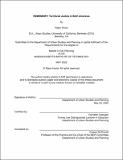REMEMORY: Territorial Justice in Both Americas
Author(s)
Hoyle, Rajan
DownloadThesis PDF (6.599Mb)
Advisor
Cadogan, Garnette
Terms of use
Metadata
Show full item recordAbstract
This thesis examines the resistance tactics used by collectives of Black and Indigenous women in the Americas to fight for housing, land, and territorial justice. I put organizers from the Black Fraternal Organization of Honduras (OFRANEH) in conversation with ancestral miners in Colombia's Cauca region, and finally with Moms 4 Housing in West Oakland to reveal themes and opportunities for solidarity and knowledge sharing across their struggles and the diaspora. Specifically, I work to tease out the limits and possibilities of property, land, and territory as viewed by each of these collectives and what cues planning might take from these insights. My research takes a journalistic and documentarian approach and leans on theory from the traditions of Black Feminist Geography, Decolonial and Postcolonial Thought, as well recent literature around property rights. In Chapter 1 I outline the structure of the paper, provide a review of the literature, and discuss my methods. Chapter 2 develops a thorough case study of Triunfo de la Cruz v. Honduras, a case that OFRANEH took all the way to the Inter-American Court of Human Rights. Chapter 3 is a case study into La Toma, Colombia, and the Black artisanal miners who organized La Marcha de los Turbantes, where 80 women marched 10 days and 350 miles to Bogotá to demand an end to unpermitted industrial mining along the Ovejas River. Chapter 4 is another case study that looks at West Oakland, USA, and Moms 4 Housing occupying a real estate owned residential property to bring attention to the real estate speculation crisis in Oakland. Finally, in Chapter 5, I conclude and posit that the planning work from below undertaken by Black women collectives is under interrogated and the Black women who have led this work for generations have too often been erased from the narrative of struggle. I advocate a recentering of resistance narratives, development of solidarity networks across and throughout the Black diaspora, and for more expansive and culturally responsive approaches to planning around property, land, and territorial justice in Black communities in the Americas and beyond.
Date issued
2022-05Department
Massachusetts Institute of Technology. Department of Urban Studies and PlanningPublisher
Massachusetts Institute of Technology